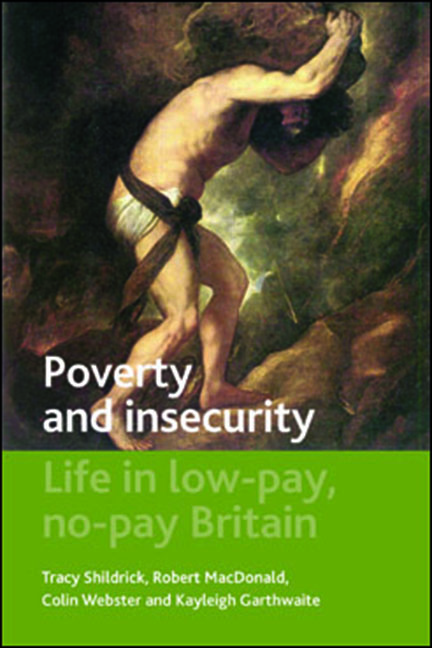Book contents
- Frontmatter
- Contents
- List of figures and boxes
- Acknowledgements
- 1 Introduction
- 2 Poor work, welfare and poverty
- 3 Researching the low-pay, no-pay cycle and recurrent poverty
- 4 The low-pay, no-pay cycle: the perspectives and practices of employers and ‘welfare to work’ agencies
- 5 The low-pay, no-pay cycle: its pattern and people's commitment to work
- 6 Searching for jobs: qualifications, support for the workless and the good and bad of informal social networks
- 7 Poor work: insecurity and churning in deindustrialised labour markets
- 8 ‘The ties that bind’: ill health and caring and their impact on the low-pay, no-pay cycle
- 9 Poverty and social insecurity
- 10 Conclusions
- References
- Index
7 - Poor work: insecurity and churning in deindustrialised labour markets
Published online by Cambridge University Press: 07 September 2022
- Frontmatter
- Contents
- List of figures and boxes
- Acknowledgements
- 1 Introduction
- 2 Poor work, welfare and poverty
- 3 Researching the low-pay, no-pay cycle and recurrent poverty
- 4 The low-pay, no-pay cycle: the perspectives and practices of employers and ‘welfare to work’ agencies
- 5 The low-pay, no-pay cycle: its pattern and people's commitment to work
- 6 Searching for jobs: qualifications, support for the workless and the good and bad of informal social networks
- 7 Poor work: insecurity and churning in deindustrialised labour markets
- 8 ‘The ties that bind’: ill health and caring and their impact on the low-pay, no-pay cycle
- 9 Poverty and social insecurity
- 10 Conclusions
- References
- Index
Summary
Introduction
In this and the following chapter we seek to understand the interviewees’ work histories in more depth. In Chapter 8 we examine the ‘supply side’ of the labour market – how personal issues and family circumstances, often rooted in wider social disadvantages, had an impact on people's engagement with work. In this chapter we are concerned with the ‘demand side’ of the ‘employability’ equation (Lindsay and McQuaid, 2005), or more precisely, how research participants experienced the sorts of employment that they did and what we can learn about the low-pay, no-pay cycle from their descriptions. We begin by noting the deindustrialisation of Teesside's labour market and how this has created a context where the jobs available to the research participants were now defined by their low pay, low skill and insecurity. The following section, introduced by three cases, examines in depth the experience of doing poor work. Reasons for leaving and losing jobs are then discussed. Despite the predominant experience being one of poor work, interviewees still found work to hold positive social and psychological benefits, the focus of the penultimate section. Finally, we briefly note the exceptional cases of individuals who had managed to locate better quality employment and escape the low-pay, no-pay cycle.
Teesside's deindustrialised labour market
“Everything's just gone. The clothing industry went, the steel industry went, the shops are going … my friend's daughter, she's been to college, but she can't even get a job in a shop. They’re not taking people on. She put her name down for Argos, all places that do well at Christmas, but just nothing. There's that many people got their name down for these jobs, there's nothing for this area.” (Janice, 56)
“I think it's absolutely terrible. When I was 18 my dad got me a job at Corus [local steelworks] and that's all changed now. Your parents can't just get you in. It's all changed now.” (Chris, 32)
“It's even worse at the minute. Everybody's looking for the same thing. Even my dad who's been in a job since he left school [as a bricklayer] it's the first time he had to sign on.” (Richard, 30)
Younger and older interviewees were aware of the dramatic changes that have affected Teesside's economy (see Chapter 3).
- Type
- Chapter
- Information
- Poverty and InsecurityLife in Low-Pay, No-Pay Britain, pp. 125 - 142Publisher: Bristol University PressPrint publication year: 2012



